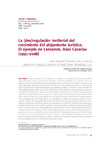Please use this identifier to cite or link to this item:
https://accedacris.ulpgc.es/jspui/handle/10553/42905
| Title: | The territorial (De) regulation of the growth of tourist accommodation. the example of lanzarote, the canary Islands (1991-2008) | Other Titles: | La (des)regulación territorial del crecimiento del alojamiento turístico. El ejemplo de Lanzarote, Islas Canarias (1991-2008) | Authors: | Parreño Castellano, Juan Manuel González Morales, Alejandro Hernández Luis, José Ángel |
UNESCO Clasification: | 54 Geografía | Keywords: | Regulating tourism Tourist moratorium |
Issue Date: | 2018 | Journal: | Ciudad y Territorio Estudios Territoriales | Abstract: | Since the beginning of the 1990s, the first measures regulating tourism in the Spanish archipelagos began to be approved. In the Canary Islands, these measures were delayed until the end of that decade, except in the case of Lanzarote, where the tourism growth had been tried to be regulated by the Insular Plan of 1991 and its revision of 1998. Despite the achievements, the measures have not achieved the desired results. Moreover, their non-compliance has uncovered a generalized scenario of urban corruption. The objective of this paper is focused on the analysis of the regulatory processes developed in Lanzarote in 1991 and 1998, with the tourist moratorium approved in this last year. In particular, we will analyze the case of canceled urban planning licenses that were granted after this last year and which were a flagrant breach of the tourist moratorium. Several sources have been used to carry out this study: normative documents, reports, territorial planning and urban planning plans, official statistics, society registration information and journalistic sources. The analysis shows the inability of planning to reorient the tourist and territorial model on the island, always overrun by the interests of owners and economic agents; the disaffection of the touristic activity and its administrative management with the urban discipline and, finally, the heterogeneity of interests, from the local to the international scale, which underlies the non-fulfillment of the tourist moratorium of the island. : Desde principios de los noventa, se empezaron a aprobar las primeras medidas reguladoras de la oferta turística en los destinos insulares españoles. En Canarias, estas medidas se retrasaron hasta finales de esa década, salvo en el caso de Lanzarote, en donde ya se había intentado regular el crecimiento turístico con el Plan Insular de 1991 y su revisión en 1998. A pesar de los logros conseguidos, las medidas puestas en marcha no han obtenido los resultados deseados. Aún más, su incumplimiento ha destapado un escenario generalizado de corrupción urbanística. El objetivo de este artículo se centra en el análisis de los procesos regulatorios desarrollados en Lanzarote en 1991 y 1998, con la moratoria aprobada en este último año. Se analiza con más detalle el caso de las licencias urbanísticas anuladas que fueron concedidas tras este último año y que supusieron un flagrante incumplimiento de la moratoria turística. Para la realización de este estudio se ha recurrido a fuentes diversas: documentos normativos, informes, planes de ordenación territorial y planificación urbanística, estadísticas oficiales, información registral de las sociedades implicadas y fuentes periodísticas. El análisis muestra la incapacidad que la planificación insular ha tenido para reorientar el modelo turístico-territorial en la isla, desbordada siempre por los intereses de propietarios y agentes económicos. Asimismo, se pone en evidencia la desafección que la actividad turística e, incluso, la gestión administrativa de ésta muestran con la disciplina urbanística y, por último, la heterogeneidad de intereses, desde el ámbito local hasta el internacional, que subyace en el incumplimiento de la moratoria turística de la isla. |
URI: | https://accedacris.ulpgc.es/handle/10553/42905 | ISSN: | 1133-4762 | Source: | Ciudad y Territorio Estudios Territoriales [ISSN 1133-4762], v. 50(195), p. 53-70 |
| Appears in Collections: | Artículos |
SCOPUSTM
Citations
3
checked on Jun 8, 2025
Page view(s)
66
checked on Jan 10, 2026
Download(s)
2
checked on Jan 10, 2026
Google ScholarTM
Check
Share
Export metadata
Items in accedaCRIS are protected by copyright, with all rights reserved, unless otherwise indicated.
